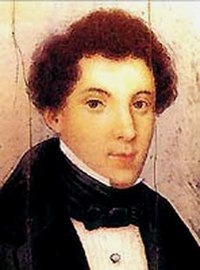Juan Crisóstomo Arriaga
| Juan Crisóstomo Jacobo Antonio de Arriaga y Balzola | |
|---|---|

Juan Crisóstomo Arriaga
|
|
| Born |
January 27, 1806 Bilbao, Spain |
| Died | January 17, 1826 (aged 19) Paris, France |
| Occupation | Composer |
| Parent(s) | Juan Simón de Arriaga |
Juan Crisóstomo Jacobo Antonio de Arriaga y Balzola (January 27, 1806 – January 17, 1826) was a Spanish Basque composer. He was nicknamed "the Spanish Mozart" after he died, because, like Wolfgang Amadeus Mozart, he was both a child prodigy and an accomplished composer who died young. They also shared the same first and second baptismal names; and they shared the same birthday, January 27 (fifty years apart).
Juan Crisóstomo Arriaga was born in Bilbao, Biscay, on what would have been Mozart's fiftieth birthday. His father (Juan Simón de Arriaga) and the boy's older brother first taught him music. Juan Simón had some musical talent and at age seventeen was an organist at a church in Berriatúa. He worked in Guernica and in 1802 moved to Bilbao and became a merchant in wool, rice, wax, coffee, and other commodities. The income generated in this way allowed Juan Simón to think about providing his son, who had shown prodigious musical talent, a way of developing those gifts.
In September 1822 Arriaga's father, with the encouragement of composer José Sobejano y Ayala (1791–1857), sent Juan Crisóstomo to Paris, where in November of that year Arriaga began his studies. These included the violin under Pierre Baillot, counterpoint with Luigi Cherubini and harmony under François-Joseph Fétis at the Paris Conservatoire. From all evidence, Arriaga made quite an impression on his teachers. In 1823, Cherubini, who had become director at the Conservatoire the previous year, famously asked on hearing the young composer's Stabat Mater, "Who wrote this?" and learning it was Arriaga, said to him, "Amazing – you are music itself."
Arriaga soon became a teaching assistant in Fétis's class, and also became noted both among the students and other faculty at the Conservatoire for his talent. Cherubini referred to Arriaga's fugue for eight voices (also lost) based on the Credo Et Vitam Venturi simply as "a masterpiece", and Fétis was no less effusive—apparently, what impressed all his mentors was Arriaga's ability to use musically sophisticated harmonies, counterpoint, and related techniques, without having been taught. Fétis was already familiar with Arriaga's now-lost opera Los Esclavos Felices ("The Happy Slaves"), stating that "without any knowledge whatsoever of harmony, Juan Crisóstomo wrote a Spanish opera containing wonderful and completely original ideas." Arriaga was well-supported during his four years in Paris by his father, but the intensity of his commitment to his studies at the Conservatoire and the almost meteoric rise one could expect based on his teachers' compliments and assessments of his promise, may have taken a toll on his health. Juan Crisóstomo de Arriaga died in Paris ten days before his twentieth birthday, of a lung ailment (possibly tuberculosis), or exhaustion, perhaps both. He was buried in an unmarked grave at the Cimetière du Nord in Montmartre. Thanks to the Spanish Embassy, there is since 1977 a plaque marking the house at 314 rue Saint-Honoré in memory of the composer.
...
Wikipedia
